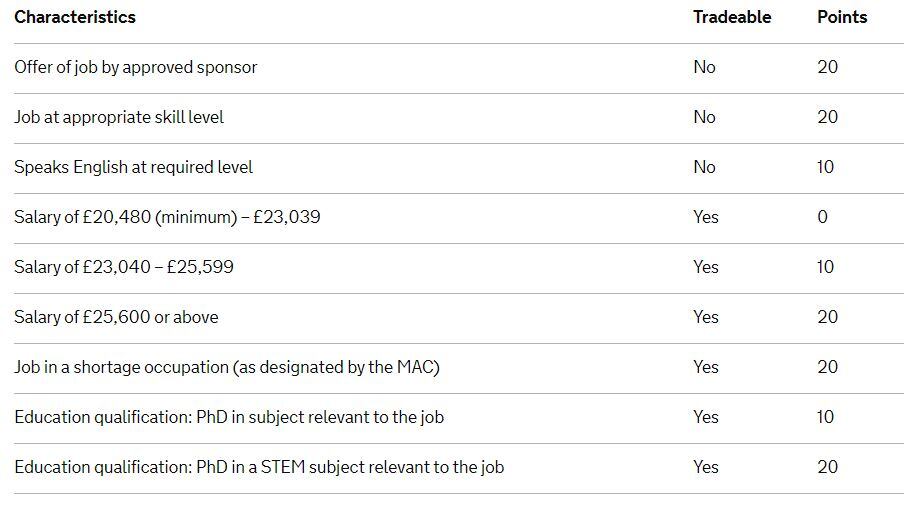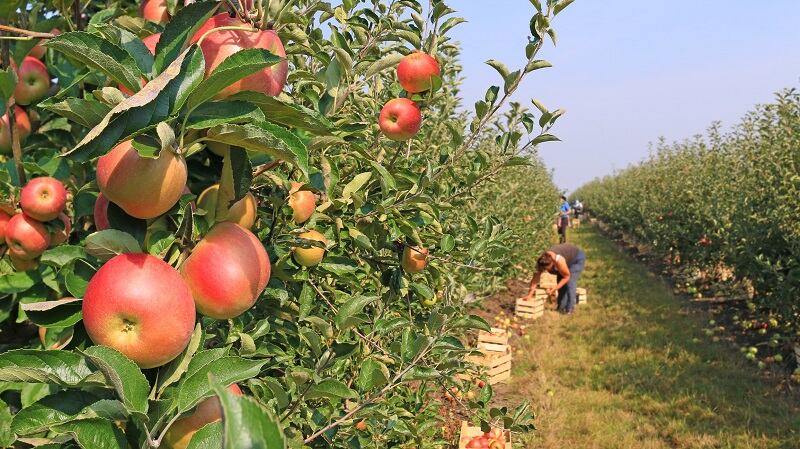The new points-based system will replace the EU founding principle freedom of movement and aims to encourage higher-skilled immigration.
The idea, according to the government, is to “take back control of our own immigration policy for the first time in decades and it will mean that we will have a global immigration system that doesn’t discriminate between EU and non-EU, and it’ll basically mean that the brightest and the best will be able to come to United Kingdom.”
The Home Office said EU and non-EU citizens coming to the UK would be treated equally after UK-EU free movement ends on 31 December. It said the policy, which could cut EU migration by 70%, will “turn off the tap on cheap, foreign, low-skilled labour” and encourage highly skilled labour from overseas. It also wants employers to invest in retaining staff and in developing automation technology.
EU applicants will now need to score 70 points, made of a combination of credentials such as education, salary and whether the job is deemed to be in an area where there are skills shortages. Some of these are minimum requirements and some can be tradeable.

Playing politics not economics?
However, critics argue that a highly developed economy needs a far deeper supply of workers.
Daniel Pryor, Head of Programmes at the Adam Smith Institute, said that ‘attempts to end free movement of workers will reduce productivity and growth’. “Around 70% of EEA citizens who arrived in the UK since 2004 would likely be ineligible for the most common visas under the new system,” he said. “These people have massively contributed to the economic and cultural life of the UK—and concerns about future skill shortages remain paramount.”
Food security fears
The British Poultry Council said 60% of its 23,000 workers are EU nationals. It said the new rules ‘completely disregard British food production and will damage national food security’.
The BPC’s chief executive, Richard Griffiths, said: “I hope the government understands that the food on their dinner tables is produced in large part by the people who their proposed immigration policy will prevent from coming to this country.
“Poultry is half the meat the country eats. Our sector has grown significantly, beyond the UK labour availability in the areas we operate.”
He claimed that limiting access to labour has the potential to cripple food businesses and make access to quality British food harder for consumers. “We cannot run the risk of creating a two-tier food system where we import food produced to lower standards and only the affluent can afford high quality British produce.”
Automation 'won’t plug the skills gap'
He added that automation is ‘not a magic bullet that can bridge the skills gap’. “Our sector has jobs that need human skills, jobs that support our economy and communities, and jobs that ensure everyone has access to British food produced to British standards.”
The Food and Drink Federation said it welcomed the introduction of a ‘global talent route’, but warned that the UK’s food and drink industry is reliant on workers at all skill levels.
Its policy manager, Mark Harrison, said: “We have concerns about access to those potential employees who won’t qualify through these ‘skilled’ routes such as bakery assistants, meat processors, and workers essential to the production of a huge array of basic foodstuffs such as cheese, pasta, and sausages. While we are committed to promoting the use of automation and technology in our sector, the benefits of such innovations will not be felt overnight and some food chain roles remain challenging to automate. With the UK experiencing historically low unemployment rates and high vacancy levels, we believe a route for entry-level workers should be introduced which retains control of immigration while also supporting business needs, incentivising upskilling, and boosting productivity.”
These concerns were echoed by Tom Ironside, Director of Business and Regulation at the British Retail Consortium. “Retailers rely on complex supply chains and for these to function effectively must be able to access an adequate supply of workers,” he said.
“Although we welcome the reduction in the salary threshold, it is disappointing that the Government has not understood the needs of the economy and the vital contribution of workers supporting the operation of warehouses, food factories and city centre stores. When vacancies cannot be filled from the local labour market, businesses must be able to recruit from the widest talent pool available across all skill levels.
“We continue to call for a system that enables straight-forward recruitment from a range of skill levels and avoids significant increases to the cost of employment.”
Serious concerns among farmers
Farmers said that food prices could rise unless the immigration policy met the needs of agriculture. National Farmers’ Union President Minette Batters expressed serious concerns about the government’s failure to recognise British food and farming’s needs within its proposed immigration policy.
Batters said: “As the UK’s largest manufacturing sector, British food and farming is at the very core of our economy and any immigration policy must deliver for its needs.
“We have said repeatedly that for farm businesses it is about having the full range of skills needed – from pickers and packers to meat processors and vets – if we are to continue to deliver high quality, affordable food for the public. Failure to provide an entry route for these jobs will severely impact the farming sector.
“Automation will have a vital role to play and we fully support investment in this area, but it is not yet a viable option to replace the number of people we need and farmers will need a practical solution in the meantime. There are also some jobs that simply cannot be replaced by technology.”
One positive note for farmers was the announcement by the government that it will quadruple the seasonal agricultural scheme, which Batters said will ease some of the pressure for the coming season. However, she said growers remain very concerned about how they will recruit vitally important seasonal workers in future.
“We are urging the government to commit to delivering a full scheme for 2021, which will enable us to recruit the 70,000 seasonal workers needed on British fruit, veg and flower farms. It is ironic that the government on the one hand is encouraging more people to increase the amount of fruit and veg in diets, yet on the other hand making it harder for that fruit and veg to be produced in Britain.
“There are several issues within this proposed policy that need addressing, not least the incredibly short timeframe given for businesses to prepare, and we will be contributing to any consultation to ensure the views of Britain’s farmers are heard.”
Costlier Christmases?
The BRC’s Griffiths called on the government to extend the seasonal worker scheme to poultry meat to ensure Christmas turkeys remain affordable and available for all UK consumers. “Around 9 million British turkeys are reared for Christmas every year to some of the highest standards in the world,” he said.





